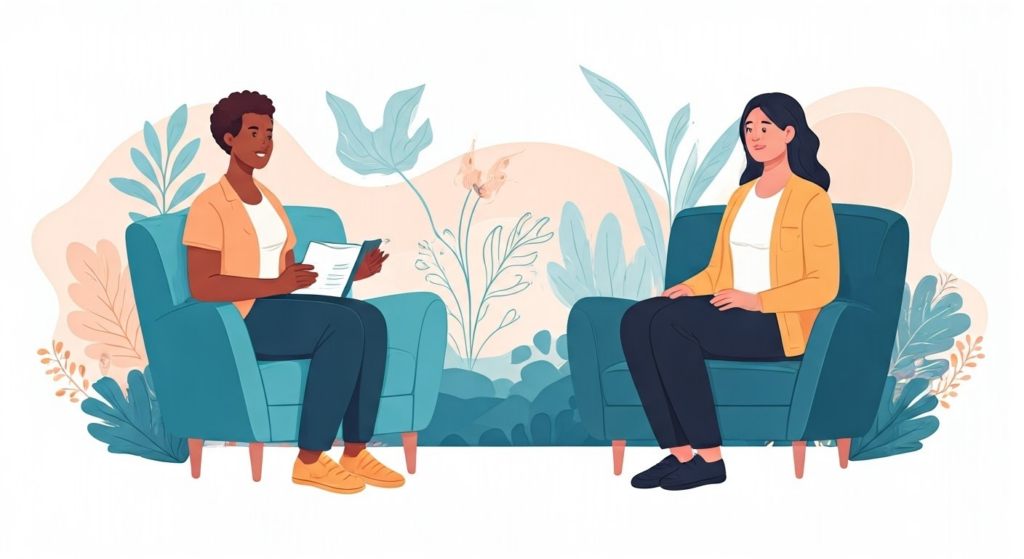Decoding Psychotherapy vs. Therapy

- While often used interchangeably, psychotherapy and therapy are distinct approaches to addressing mental and emotional well-being.
- Psychotherapy typically involves long-term, in-depth exploration of deep-seated psychological issues, aiming for significant personal growth and healing.
- Therapy encompasses a broader range of treatments for both mental and physical health, with some forms focusing on immediate, situational problems.
- Understanding your specific needs, the nature of your challenges, and the expertise of different professionals is crucial when choosing between psychotherapy and therapy.
- Both psychotherapy and therapy are valuable tools for improving mental health and overall well-being, and the right choice depends on individual circumstances.
The words “psychotherapy” and “therapy” can be confusing. They both relate to mental health and can benefit people from all walks of life. However, they are not the same. Each has its own way of helping people. In this discussion, we will explain the differences between therapy and psychotherapy. This will help you understand them better. You can then make good choices for your mental health journey.
Understanding the Basics of Psychotherapy and Therapy

Psychotherapy is a process that can take a long time. It focuses on complex mental health concerns, past traumas, and emotional struggles. In psychotherapy, talk therapy and other techniques help people understand their thoughts, feelings, and actions. This understanding can lead to positive changes and lasting well-being.
On the other hand, therapy is a broader term. It includes different treatments for both physical and mental health conditions. When we talk about mental health, therapy usually means short-term treatments with specific goals. It helps people learn coping strategies to deal with certain challenges or symptoms.
Defining Psychotherapy: A Deep Dive
Psychotherapy, including humanistic therapy, looks into a person’s emotional world. It helps find the main reasons for their mental distress. This type of treatment is very helpful for people facing ongoing mental illness, serious emotional issues, or those who want to grow personally.
There are many types of psychotherapy, each with its own methods and ideas. For example, psychodynamic therapy looks at how our unconscious thoughts and past experiences affect our behaviors today, often addressing symptoms of depression. On the other hand, cognitive behavioral therapy (CBT) helps change negative thoughts and behaviors into healthier ones.
Choosing the right type of psychotherapy depends on what someone needs and the problems they face. A skilled mental health professional can help figure out the best option for them.
Therapy is a general term that covers many types of treatments for different conditions, both mental and physical. For mental health, therapy often means talk therapy. This kind of therapy helps people deal with various issues, like problems in relationships or managing stress, and it is considered an umbrella term for different therapeutic approaches.
Cognitive behavioral therapy (CBT) is a popular type of cognitive therapy. It looks at how thoughts, feelings, and actions are linked. CBT helps people learn skills to cope with symptoms of anxiety, depression, and more.
The best type of therapy depends on what each person needs and prefers, as well as the specific issue they are facing. It is a good idea to talk with a qualified mental health provider about finding the most effective treatment that fits your situation. They can help you get the care that fits your situation.
Key Differences Between Psychotherapy and Therapy

The main difference between psychotherapy and therapy is their focus and goals. Psychotherapy usually takes a long time. It looks deeply into personal issues and aims to change a person’s life. It works on complicated mental health problems that come from past events or strong thoughts.
On the other hand, therapy, especially talk therapy, is shorter and more focused. It helps people learn ways to handle current problems or symptoms. This can make them feel more in control in their daily life.
Duration and Depth of Treatment
The duration and intensity of treatment vary significantly between psychotherapy and therapy. This distinction directly correlates to the nature and complexity of the issue being addressed. Typically, psychotherapy, due to its depth-oriented approach, requires a more significant time commitment.
The table below further emphasizes the differences in duration and treatment focus between psychotherapy and therapy:
| Feature | Psychotherapy | Therapy |
|---|---|---|
| Duration | Long-term, often months to years | Short-term or long-term, depending on the type of therapy |
| Focus | Addressing root causes, deep-seated issues, personal growth | Managing symptoms, developing coping skills, improving quality of life |
Ultimately, the duration and focus of treatment depend on the chosen type of psychotherapy or therapy and the individual’s progress. A collaborative approach with your mental health provider ensures the treatment plan aligns with your needs and goals.
Goals and Outcomes Compared
While both psychotherapy and therapy work to improve mental health, they have different aims and results. Psychotherapy focuses on deep exploration. It seeks major personal growth and transformation. Therapy, on the other hand, aims to help people with coping skills, managing symptoms, and improving quality of life.
For those trying to heal from past traumas or explore their feelings, psychotherapy can be very helpful. It creates a space to understand the main causes of stress and supports lasting change.
In contrast, therapy often provides practical tools for managing current problems. It can help reduce anxiety, boost communication skills, or assist with specific life changes.
The Various Forms of Psychotherapy and Their Benefits
The area of psychotherapy includes many different approaches. Each one has its own ideas, methods, and uses. These different types of psychotherapy help meet the various needs of people looking for mental health support and improving interpersonal relationships.
For example, cognitive behavioral therapy (CBT) looks at how thoughts, feelings, and actions work together. On the other hand, psychodynamic therapy looks at deep feelings and past experiences. The best type of therapy for someone depends on their specific issues, what they prefer, and their treatment goals.
Cognitive Behavioral Therapy: A Closer Look
Cognitive behavioral therapy (CBT) is a common type of therapy that many people and researchers in the United States use. It works well for different mental health concerns. CBT is based on the idea that our thoughts, feelings, and actions are linked. By finding and changing unhelpful patterns in these areas, we can see big improvements in our mental health.
CBT therapists help people notice and challenge negative thoughts that cause them pain, particularly when addressing addiction issues. When individuals learn to change these thoughts and develop better ways to cope, they can effectively handle issues related to anxiety disorders, depression, and other mental health conditions.
CBT has a clear and goal-driven way of working. It gives people useful skills and strategies to use in their everyday lives, even after therapy ends. This helps create positive changes that last.
Psychodynamic Therapy: Understanding the Inner Self
Psychodynamic therapy is based on the ideas of Sigmund Freud. It focuses on how our unconscious thoughts, feelings, and past experiences affect our emotions and actions today. This type of therapy helps people explore deep emotional issues, understand relationship patterns, and learn about what drives their behavior.
In therapy sessions, the therapist encourages people to share their thoughts and feelings openly. This creates a space for self-reflection and exploration. Through this journey, individuals can discover hidden patterns that may be causing current problems. They can also work through internal conflicts and develop better ways to cope.
Although psychodynamic therapy often requires a longer commitment than other therapies, the insights gained can lead to significant personal growth and meaningful change. It helps address the root causes of emotional issues.
The field of mental health care is more than just regular talk therapy. It includes different ways to help people on their path to feeling better. Knowing about these different options helps individuals choose what works best for them.
We will look at how counseling and clinical therapy compare. This will show us the unique roles each has in mental health services. We will also talk about how alternative therapies are changing and what good they might bring.
Counseling vs. Clinical Therapy: Clarifying the Confusion
The words “mental health counseling” and “clinical therapy” are often used the same way, but there are key differences between the two types of mental health services. Knowing these differences can help people looking for support find the right fit for their needs.
Counseling usually deals with specific problems and offers guidance, support, and ways to cope. Mental health counselors often help people who are going through life changes, facing relationship issues, managing stress, or dealing with grief and loss.
Clinical therapy, on the other hand, is often given by licensed professionals with advanced education in a related field. Clinical therapists go deeper into mental health concerns. They can diagnose and treat mental health disorders and use a variety of approaches that suit each person’s needs.
The Role of Alternative Therapies in Mental Health
More people are looking at alternative therapies to improve their mental wellness. These methods work with traditional psychotherapy and therapy. They are based on whole-body health ideas and can help with overall well-being.
Alternative therapies cover a wide range, and each has its own focus:
- Mindfulness-based practices: Meditation, yoga, and tai chi help you relax, lower stress, and improve your emotions.
- Art and music therapy: Being creative helps express feelings, understand yourself better, and connect with others.
- Acupuncture and acupressure: These are traditional Chinese medicine methods that balance energy in the body. They might help reduce anxiety, depression, and sleep problems.
Research about how well alternative therapies work for mental health conditions continues. Still, many people find that these practices help lift their mood, lower stress, and improve their quality of life.
Who Should Seek Psychotherapy vs. Therapy?
Choosing between psychotherapy and therapy depends on different things. These include how serious your problems are, what your personal goals are, and what type of treatment you prefer.
Talking with a mental health provider is very important to get advice that fits your needs. People who feel deeply upset, deal with ongoing mental health conditions, or want to understand themselves better might benefit more from psychotherapy. On the other hand, therapy, especially short-term methods, can help people learn ways to cope with specific challenges or symptoms in their lives.
Identifying Your Needs: A Guide to Choosing
Identifying what you need is very important when looking for therapy. Here are some steps to help you choose the right type of therapy for you.
First, think about the problems you face. Are you dealing with old emotional patterns, wanting to grow personally, or facing immediate stress and changes in life? Understanding your goals helps you choose the best options.
Then, think about how you prefer to work in therapy. Do you want to explore deeply to find root causes? Or do you prefer to focus on managing symptoms and building skills? Knowing what techniques and styles make you comfortable will help you find a good fit.
When to Consider Professional Help
Recognizing when you need help for your mental health is very important. Getting help early can lead to better results. It is normal to have emotional ups and downs. However, ongoing struggles can seriously affect your daily life and overall well-being.
If you are feeling overwhelming stress, ongoing sadness, constant worry, or have clear changes in your sleep or appetite, it is important to contact a mental health professional. These signs might point to a major depressive disorder or another mental health condition that needs expert care.
Keep in mind that asking for help shows strength and a desire to focus on your well-being. Mental health professionals can offer support, guidance, and proven treatments. They can assist you in dealing with emotional problems, managing mental health conditions, and improving your quality of life.
In conclusion, knowing the differences between psychotherapy and therapy can help you make better choices about mental health treatment. Psychotherapy focuses more on the deeper issues, while therapy provides general support. The best choice depends on what you need and prefer. It’s important to take care of your mental well-being, whether you are looking for a psychotherapist or a therapist. If you are not sure which way to go, think about how long you want the treatment, your goals, and how comfortable you feel. Remember, seeking help for your mental health is a good decision for your overall well-being. If you need more help with these options, talk to a mental health professional.
What are the signs I might need psychotherapy instead of general therapy?
You might need psychotherapy if you often face emotional problems that do not go away. It may also be a sign if you have deep issues that affect your daily life. Additionally, wanting to tackle the root causes of a mental health issue with the guidance of a health care provider can show that therapy may help you.
Can I benefit from both psychotherapy and therapy simultaneously?
Yes, if you have certain mental health conditions, it can be very helpful to have both psychotherapy and another type of therapy at the same time. This approach is often suggested based on your needs.
How do I choose between a psychotherapist and a therapist?
When deciding between a therapist and a psychotherapist, think about your mental health needs. Also, consider the therapist’s skills and how well they communicate during your meetings.
Are there conditions better treated by psychotherapy?
Personality disorders, complex trauma, and serious mental disorders usually get better with intense psychotherapy. Different treatments may be used.
What should I expect in my first therapy or psychotherapy session?
In your first session, you will talk about why you want therapy. You will share your background and current problems. This is also a chance to build a connection with the mental health professional.
https://order.store.mayoclinic.com/flex/mmv/HLFBOOK
https://order.store.mayoclinic.com/flex/mmv/SLEEP01
https://www.samhsa.gov/find-help
https://www.instagram.com/marriagefamilyservices
https://www.psychiatry.org/patients-families/find-a-psychiatrist

